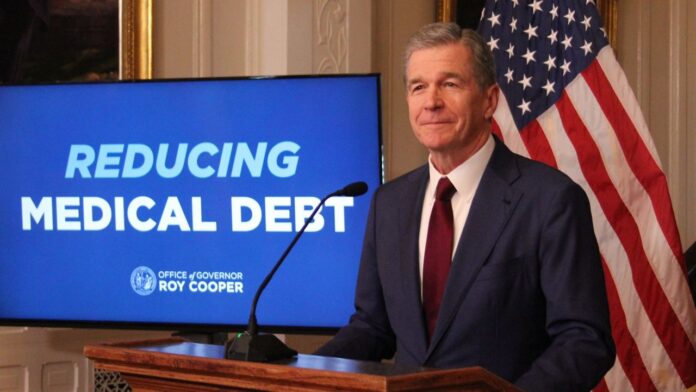RALEIGH, N.C. (AP) — All qualifying North Carolina hospitals have agreed to participate in a first-of-its-kind initiative that will give them higher Medicaid payments if medical debt of low- and middle-income patients they hold is relieved and they carry out ways for future patients to avoid liabilities, Gov. Roy Cooper announced on Monday.
Cooper and state Health and Human Services Secretary Kody Kinsley unveiled six weeks ago a proposal submitted to federal Medicaid regulators that they said could help about two million people in the state get rid of $4 billion in debt held by hospitals, which usually only can recoup a small portion.
“This makes sense for the hospitals, their patients and their communities,” Cooper said at a news conference in which he revealed all 99 qualifying hospitals — including the state’s largest hospital systems — have committed to the voluntary debt-elimination effort.
The Centers for Medicare and Medicaid Services signed off last month on the plan details, which build on a Medicaid reimbursement program started recently for 99 acute-care, rural or university-connected hospitals. The hospitals were asked to make their participation decisions known by late last week.
Changes that benefit consumers will begin in the coming months, including by next July 1 the elimination of medical debt going back to early 2014 for the hospitals’ patients who are Medicaid enrollees. The hospitals in time also will eliminate medical debt that is more than two years old for non-enrollees who make below certain incomes or whose debt exceeds 5% of their annual income.
“We are often confronted with messages that tackling medical debt is impossible,” said Jose Penabad, a board member with Undue Medical Debt, a national group that will work with North Carolina hospitals, but “today is a message of hope.”
The hospitals also will agree to carry out programs going forward to discourage debt. By Jan. 1, for example, hospitals will automatically enroll people in charity care programs if they already qualify for food stamps and other welfare programs. And by July they’ll have to curb debt collection practices by not telling credit reporting agencies about unpaid bills and by capping interest rates on medical debt.
The qualifying hospitals already participate in what’s called the Healthcare Access and Stabilization Program. The General Assembly approved it last year along with expanded Medicaid coverage to working adults who couldn’t otherwise qualify for conventional Medicaid. Hospitals pay assessments to draw down billions of dollars in federal money.
The HASP hospitals are now poised to receive even higher levels of reimbursement by agreeing to the medical debt initiatives. Kinsley’s department said that hospitals that otherwise would have shared funds from a pot of $3.2 billion this fiscal year now will benefit from an estimated $4 billion and a projected $6.3 billion in the next year.
Other state and local governments have tapped into federal American Rescue Plan funds to help purchase and cancel residents’ debt for pennies on the dollar
Cooper, a Democrat who leaves the job in January, acknowledged recently that hospitals had responded somewhat negatively to the medical debt effort. He said Monday he believed that hospitals were put off initially because HASP funds previously unrestricted were now going to be tied to debt-reduction incentives.
But ultimately “these hospitals looked at the bottom line, looked at the benefits to their patients and communities and decided to sign up,” he said.
The North Carolina Healthcare Association — which lobbies for nonprofit and for-profit hospitals, said Monday in a news release that it “stands ready” to help hospital implement the new debt relief initiative. “We are also committed to addressing the root causes of medical debt and will continue to work with partners to improve access to affordable, high-quality care,” the group added.



